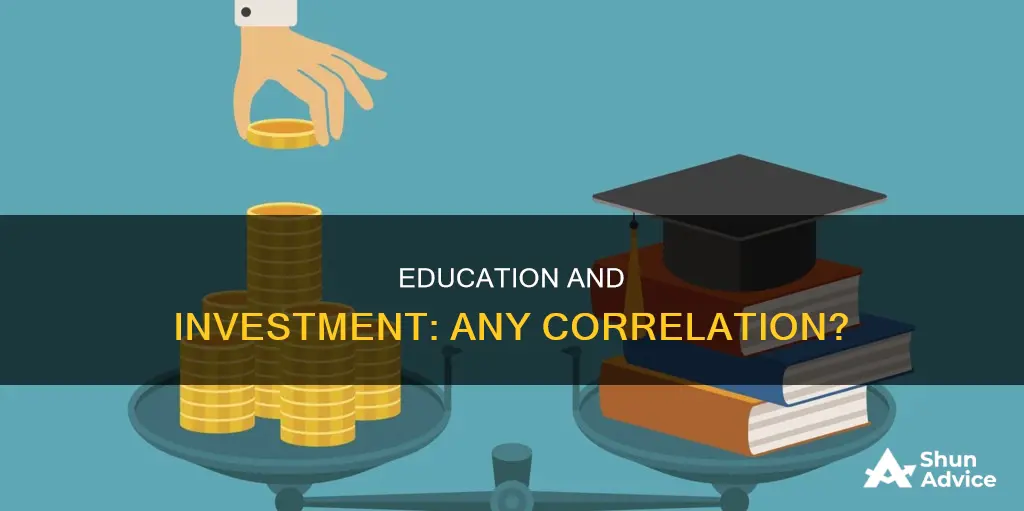
There is a strong correlation between education and an individual's likelihood to invest. People with higher education tend to have higher incomes, and investing in oneself through education can open doors to better career opportunities, higher-paying jobs, and improved social standing. This makes educated individuals more likely to have the financial capacity and inclination to invest. Additionally, education fosters critical thinking and decision-making skills, empowering individuals to make informed choices about their finances, including investing. From a societal perspective, countries with a more educated population tend to experience higher levels of economic development, which can further encourage investment. Furthermore, foreign investors are often attracted to locations with a highly educated workforce, particularly in sectors such as life sciences, finance, and research and development.
What You'll Learn

Education improves critical thinking skills
Education is a broad concept that extends beyond the classroom and encompasses various aspects of personal and professional development. It is widely acknowledged that education plays a pivotal role in enhancing critical thinking skills, which are essential for success in diverse spheres of life. Here are several reasons why education improves critical thinking abilities:
Enhancing Creativity and Curiosity:
Education fosters an environment that encourages critical thinking, stimulating curiosity about the world. Students are prompted to analyse, assimilate information, and form their own informed ideas, often resulting in out-of-the-box thinking. This curiosity and analytical mindset are transferable skills that benefit both personal and professional pursuits.
Promoting Self-Assertion and Self-Reflection:
Critical thinking involves self-directed, disciplined, and self-monitored thinking. It enables individuals to internalise and objectively understand complex issues, thereby boosting self-confidence in their ability to navigate the world. This skill is invaluable for making sense of new information, adapting to changing circumstances, and learning from mistakes.
Boosting Career Prospects:
In today's dynamic job market, employers seek employees with strong critical thinking skills who can analyse information from diverse sources and devise innovative solutions. Education equips individuals with these abilities, making them valuable assets in the workplace and enhancing their career prospects.
Nurturing Problem-Solving and Innovation:
Critical thinking is intrinsically linked to effective problem-solving. It enables individuals to separate facts from opinions and fiction, examining issues from multiple angles before making rational decisions. This skill is particularly crucial in addressing universal challenges such as global warming, pollution, and pandemics, where creative and lasting solutions are needed.
Fostering Allied Life Skills:
Critical thinking begets a host of other life skills, including organisational abilities, planning, open-mindedness, and enhanced communication. It encourages confidence and independence, shaping successful lives both personally and professionally. Critical thinkers learn from their mistakes, continually refining their approach and increasing their productivity.
Refining Research Skills:
Education, particularly at higher levels, emphasises the importance of research. Critical thinking skills enable individuals to conduct accurate and thorough research by observing, analysing, synthesising, and experimenting with various aspects of a subject matter or problem. This skill is invaluable for those seeking to contribute to fields such as banking and finance, where data analysis and informed decision-making are paramount.
In conclusion, education is a powerful tool for enhancing critical thinking abilities, which are essential for personal growth, career advancement, and addressing societal challenges. By investing in education, individuals gain the skills to think independently, creatively, and analytically, empowering them to make well-informed decisions and contribute positively to their communities.
Investments: The Drive to Gain More
You may want to see also

Educated people are more likely to be atheists
The relationship between religiosity and education levels has been studied since the second half of the 20th century. While the results are varied, some studies have found that more educated people are more likely to be atheists.
According to a Pew Research Center survey, US adults with college degrees are less religious than those with less education. They are less likely to say that religion is "very important" in their lives, less inclined to believe in God with absolute certainty, and less likely to pray daily. College graduates are also more likely to describe themselves as atheists or agnostics.
A similar pattern is observed in the religiously unaffiliated, or those who identify as atheists, agnostics, or "nothing in particular". Among this group, those with college degrees are considerably less religious than those without. For example, while 36% of unaffiliated individuals with a high school diploma or less say they believe in God with absolute certainty, only 15% of college-educated unaffiliated individuals share this view.
However, it is worth noting that the relationship between education and religiosity is complex and varies across different religious groups and countries. For instance, a 2015 global survey by Gallup International found that the most religious individuals had lower levels of education, but religious people were still a majority across all educational levels. Additionally, a 2016 Pew Center study found that Jews are the most educated religious group globally, while Hindus have the lowest level of formal schooling.
The reasons behind the observed relationship between education and atheism are multifaceted. One explanation suggests that educated people are more capable of critical thought and skeptical inquiry, leading them to question religious claims. However, this does not fully account for the persistence of religious belief among educated individuals, particularly in the past when many distinguished scientists were deeply religious.
Another perspective posits that religion serves as a mechanism for coping with unpleasant emotions and life's difficulties. In less educated countries, where the standard of living is poor and people face various challenges, religion provides answers and comfort. As the quality of life improves with economic development, the importance of religion may decline, leading to a potential decrease in religious belief over time.
Wealthy Secrets: Where the Rich Invest
You may want to see also

Education improves social standing
Education is a powerful tool that offers numerous benefits to individuals, societies, and even countries. One of the key advantages of education is its positive impact on social standing. Here are some reasons why education improves social standing:
Education Expands Social Circles and Connections
Obtaining a good education often involves interacting with diverse individuals, including professors, peers, and alumni networks. These interactions can lead to valuable connections and expanded social circles. Attending a reputable college or university can expose individuals to a broader network of successful and influential people, enhancing their social standing.
Education Leads to Higher Income and Professional Success
Educated individuals tend to have better career opportunities and higher-paying jobs. Higher education is often linked to higher income levels, which can improve one's social status. Employers often view education as a valuable asset, leading to promotions, increased responsibilities, and improved professional success.
Education Fosters Social Mobility
Education is a great equaliser and provides individuals from all backgrounds with the opportunity to improve their lives. It enables social mobility by giving people the skills and knowledge to pursue careers that may have otherwise been inaccessible. This can lead to a change in social status and greater acceptance in society.
Education Improves Social Skills and Communication
Education is not just about academic knowledge; it also enhances social skills and communication abilities. Through education, individuals learn to interact effectively with others, adjust their perspectives, and establish healthy relationships. These skills are valuable in both personal and professional spheres, leading to improved social connections and standing.
Education Contributes to a Country's Development
A country with a well-educated population is more likely to attract foreign investments and foster economic growth. Educated individuals contribute to a skilled workforce, driving innovation and development. This, in turn, enhances the country's reputation and global standing, which can indirectly improve the social standing of its citizens.
While education is not the sole factor determining social standing, it is a significant contributor. It empowers individuals, opens doors to new opportunities, and enables them to make a positive impact on their communities and the world.
Homes: The Ultimate Investment?
You may want to see also

Education improves health and happiness
Education is a powerful tool that enables people to lead healthier and happier lives. It empowers individuals with knowledge, enhances their understanding of health, and promotes positive lifestyle choices. Here are some reasons why education improves health and happiness:
Improved Health Literacy and Lifestyle Choices
Education enables individuals to gain health literacy, which is essential for maintaining good health. Educated people are more likely to understand the importance of a healthy lifestyle and make informed decisions about their well-being. They are better equipped to comprehend the potential harms of unhealthy behaviours, such as smoking, and are more likely to adopt healthy habits like regular exercise and a balanced diet. This knowledge empowers them to take control of their health and make positive changes.
Enhanced Access to Healthcare and Medical Information
Higher levels of education often lead to improved income, which in turn provides access to better healthcare services. Additionally, education helps individuals navigate the complex world of medical information and healthcare systems. They can more effectively utilise healthcare resources, adapt to new treatments, and benefit from advancements in medical technology. This enhanced access to healthcare contributes to improved health outcomes.
Development of Social Skills and Emotional Intelligence
Education is not just about acquiring academic knowledge; it also plays a crucial role in developing social skills and emotional intelligence. Through education, individuals learn effective communication, conflict resolution, and social interaction skills. These skills enable them to build and maintain stable social relationships, providing a sense of connection and community. Furthermore, emotional intelligence, which includes self-awareness and emotional regulation, is enhanced through education. These skills are essential for overall well-being and help individuals manage stress, anxiety, and other mental health concerns.
Increased Self-Efficacy and Life Satisfaction
Education boosts self-efficacy by providing individuals with the skills and knowledge to succeed in various aspects of their lives. It empowers them to set and achieve personal goals, enhancing their sense of accomplishment and life satisfaction. Additionally, education often leads to improved career prospects and financial stability, which further contributes to overall happiness and life satisfaction.
Long-Term Health Benefits
The benefits of education on health are not limited to the present but also extend to the long term. Studies have shown that higher levels of education are associated with increased life expectancy and reduced mortality rates. Educated individuals tend to have lower rates of chronic diseases, such as circulatory diseases and diabetes, and exhibit healthier behaviours that contribute to their overall well-being in the long run.
Bankers: Bad Apples or Bad Barrel?
You may want to see also

Education improves employability
Education is a broad concept that extends beyond the classroom and encompasses various aspects of personal growth and development. It is a lifelong currency that empowers individuals with knowledge, skills, and experiences, enhancing their employability and career prospects. Here are some ways in which education improves employability:
Enhances Employability Skills
Education helps individuals develop a diverse set of skills and attributes that are highly valued by employers. These include both "hard skills" such as problem-solving, critical thinking, and collaboration, as well as "soft skills" like communication, adaptability, and leadership. By honing these abilities, individuals become more attractive candidates for potential employers, increasing their chances of securing employment and advancing their careers.
Provides Real-World Experience
Experiential learning, or learning by doing, is a crucial aspect of education that prepares individuals for the workplace. Through internships, industry projects, and work placements, students gain practical, hands-on experience in their chosen fields. This real-world exposure equips them with the ability to apply their knowledge in real-life scenarios, making them more confident and competent as they transition into the working world.
Fosters Innovation and Creativity
Education plays a pivotal role in fostering innovation and creativity, which are highly sought-after traits in today's dynamic job market. By encouraging critical thinking and providing a foundation of knowledge, educational institutions enable students to approach challenges with fresh perspectives and develop innovative solutions. This creative mindset not only enhances their employability but also makes them valuable assets in the eyes of potential employers.
Builds Professional Networks
Networking is an integral part of career success, and educational institutions offer abundant opportunities for students to connect with peers, alumni, and industry professionals. Whether through extracurricular activities, guest lectures, or mentorship programs, students can build strong professional relationships that can open doors to future job prospects. A well-established network can provide valuable insights, mentorship, and even referrals when seeking employment.
Improves Social Standing and Credibility
A good education enhances an individual's social standing and credibility, making them more appealing to potential employers. It demonstrates a commitment to personal growth and a willingness to invest in oneself. Additionally, educational achievements serve as credible indicators of an individual's capabilities, work ethic, and discipline. This credibility boosts their employability and increases their chances of securing desirable job opportunities.
In conclusion, education is a powerful tool that enhances employability and opens doors to a wide range of career opportunities. It empowers individuals with the skills, knowledge, and experiences necessary to succeed in the job market. By investing in their education, individuals position themselves to achieve their professional goals and lead fulfilling careers.
Middle-Aged Investors: Saving Enough?
You may want to see also
Frequently asked questions
Yes, more educated people are more likely to invest. Education opens doors to better-paying jobs and increases earning potential, providing individuals with the financial means to consider investing.
Education is strongly linked to higher income levels. Individuals with higher education tend to have better career opportunities and earn higher wages, which can result in increased financial stability and discretionary income for investing.
Education empowers individuals to make more informed financial decisions. It provides the knowledge and skills needed to understand complex financial concepts, evaluate investment options critically, and assess risks and opportunities effectively.
Absolutely. Education brings numerous advantages, including improved career prospects, enhanced social standing, better communication skills, personal growth, and a higher likelihood of achieving professional success and satisfaction. It also contributes to healthier and happier lives, improved decision-making, and a more responsible and productive approach to life.







